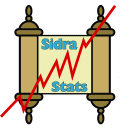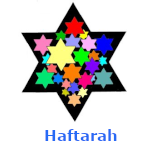Chukat
חֻקַּת
Numbers 19:1 – 22:1
The Red Cow
According to tradition, these instructions were given by HaShem to Moses and Aaron on 1 Nissan, in the second year of the Exodus, on the day the tabernacle was erected. It is mentioned at this point because contained in this conversation was the information needed to purify the people after Miriam’s death.
HaShem spoke to Moses and Aaron and explained to them exactly when and how to perform the sacrifices and rituals that would keep the Israelites pure: “Tell the Israelites to bring you a completely red cow, one that is without blemish and has never had a yoke on it. Give it to Eleazar the priest. He’ll take it outside the camp and it will be slaughtered in his presence.
“Eleazar the priest shall take the blood with his finger and sprinkle it towards the communion tent seven times. The cow, all of it, shall then be burned. The priest shall take a piece of cedar wood, some hyssop wood, and some crimson wool and throw it into the burning cow.
“The priest must then immerse his vestments and body in a mikvah and remain unclean until evening, after which he may come into the camp. The one who burns the cow must also do the same. “A ritually clean person shall gather up the cow’s ashes and take them to a clean place outside the camp. They shall be a keepsake for the Israelite community to be used for the ‘sprinkling water,’ as a means of purification. The one who gathers up the ashes must immerse in a mikvah and will also remain ritually unclean until evening.”
HaShem said, “All this shall be an eternal law for the Israelites and for any who join them:
If a person has contact with a dead human being, that person will become ritually unclean for seven days. When a person dies in a tent, every person and every thing that was in the tent is also unclean for seven days. Every open vessel that does not seal shall be unclean. Anyone who touches a victim of the sword or any other corpse, even just a human bone or an open grave, shall also be unclean for seven days. Anything an unclean person touches becomes unclean.
“In order to become clean, they must have themselves sprinkled with the purification water on the third and seventh days. If they do not do this, they cannot become clean and they shall be cut off spiritually from Israel if they defy HaShem’s Tabernacle by entering it.
“Some of the dust from the burnt purification offering shall be taken for such an unclean person. It shall be placed into a vessel that has been filled with water directly from a running spring. A ritually clean person shall take three hyssop branches and dip them into the water, using them to sprinkle the water on the tent, every thing in it, and on those who are unclean. This will be done on the third and seventh day. On the seventh day the person who is undergoing the purification must immerse in a mikvah, then they are ritually clean.
The person who sprinkles the water must also immerse in a mikvah.
Miriam’s Death & Lack of Water
In the first month (Nissan) of the 40th year of the Exodus, the entire Israelite community came to the Tzin Desert and the people stopped in Kadesh. This is where Miriam died and was buried.
Once again, the people began to complain and argue against Moses and Aaron, this time because they had no water. “Why did you bring us to the desert to die?” they asked Moses. “Why did you bring HaShem’s congregation out of Egypt to such a terrible place? Here there are no plants, nor figs, nor grapes or pomegranates. Now there isn’t even water to drink!” Moses and Aaron left the demonstrators and went to the Communion Tent entrance. They fell down to pray, their faces to the ground, and HaShem’s glory was revealed to them.
HaShem spoke to Moses, saying: “Take the staff [from the Holy of Holies] and assemble the community. Speak to the cliff in their presence and the rock will give forth water for the community and their livestock to drink.”
Moses took the staff as he had been instructed and spoke to the assembled people. “Listen now, you rebels,” Moses shouted. “Shall we produce water for you from this cliff?” He raised his hand and struck the cliff twice with the staff. A great amount of water gushed forth, and the people and their cattle drank.
Punishment of Moses and Aaron
HaShem was angry with Moses and Aaron. Instead of saying “we shall produce water” Moses should have said “HaShem will produce water.”
HaShem said to them: “You did not have enough faith in me to sanctify me in the presence of the Israelites. Therefore you will not be allowed to enter the land I have given to the Israelites.”
This place was named Meribbah, the Waters of Dispute. It was the place where the Children of Israel argued with HaShem and where HaShem was sanctified by them.
Encounter with Edom
Moses sent messengers to Hadar, the King of Edom, where the descendents of Esau [Jacob’s brother] lived. This is the message he sent: “We are your brother Israel. You know about the troubles we have encountered, how our fathers went to Egypt; how we lived in Egypt for a long time, and how the Egyptians mistreated both us and our fathers. When we cried out to HaShem, HaShem heard our voice and sent an angel to lead us out of Egypt. We are now in Kadesh, a city on the edge of your territories. Let us pass, I pray thee, through your land. We will stay on the King’s Highway, we won’t go through your fields or vineyards, nor will we drink from your wells.”
But Edom’s king said “If you pass through my land I will greet you with the sword.” The Israelites replied: “We will keep to the road. If our cattle drink any of your water we will pay full price. We only want to pass through on foot.”
“You will not pass through,” was Edom’s response and the king lead a great army to block the path and would not let Israel pass. The Israelites could not fight them for HaShem had forbidden it, so they had to go around that land.
Aaron’s Death
Moving on from Kadesh, the community came to the Hor Mountain. There, HaShem said to Moses and Aaron: “Aaron will now die and be gathered up to his people. He will not come to the land I have given to the children of Israel because he rebelled against my words at the Waters of Dispute. Moses, you take Aaron and his son Eleazar onto Hor Mountain. Remove all of Aaron’s priestly clothes off him and place them on his son. He will then be gathered up to his ancestors and die there on the mountain.”
Although HaShem’s command to prepare Aaron for death was distressing to Moses, he did as HaShem had commanded. The three of them climbed up the mountain in the presence of the congregation, but when only Moses and Eleazar came down from the mountain, the people realized that Aaron was dead. The entire family of Israel, both men and women, mourned Aaron for thirty days, for Aaron had been the peace-maker in their quarrels. It was the 1st of Av, and Aaron was 123 years old.
Confrontation with Canaan
When the Canaanite king of Arad who lived in the Negev heard the Israelites were travelling along the Atharim Highway, he attacked them and took some of them as prisoners. Israel made a vow to HaShem, “If you give this nation into my hand, I will utterly destroy their cities, and render their cities taboo.” HaShem heard Israel’s voice and allowed them to defeat the Canaanites. The Israelites named the place Taboo (Charmah).
The Snakes
The Israelites moved on from Hor Mountain going by the way of the South Sea so as to skirt the territory of Edom. The people began to become discouraged and impatient along the way. The people spoke out against HaShem and Moses, and they asked, “Why did you take us out of Egypt to die in the desert? There is no bread and no water! We are getting disgusted with this insubstantial food.”
HaShem sent snakes amongst the people and the snakes bit them and many of the congregation died. The people went to Moses and said: “We have sinned by speaking against HaShem and you. Pray to HaShem, that the snakes be taken away from us.” Moses prayed to HaShem for the people. HaShem said to Moses “Make yourself a banner with the image of a snake on it and everyone who looks at it shall live”
Moses did as he was told and made a snake (of copper or brass) and placed it high on the pole so that all the people who looked upon it would remember that it is HaShem Who Kills and HaShem Who Preserves Life. The Israelites then moved on, journeying from city to city, camping at Ovoth, then in the desolate areas along Moab’s eastern border, then on to Zered Brook. They camped in the desert near the Amorite border and they continued on the opposite side of the Aronon River until they came to B’erah, the place where HaShem said to Moses, “Gather the people, and I will give them water.”
Song at the Well
It was then that Israel sang this song:
Rise, O well, respond to this song;
The well which was dug by the princes,
Sunk by the people’s leaders,
Carved out with their staffs.
From the desert the Israelites went to Matanah. From Matanah to Nachaliel, from there to Bamoth, from there to Hagai in the field of Moab that is on the top of the cliff that overlooks the Wastelands.
Confrontations with Sichon and Og
Israel sent emissaries to Sichon King of the Amorites with the following message: “Let us pass through your land. We will not turn aside to your fields and vineyards, and we will not drink any of your water. We will follow the King’s Highway until we have passed through your territories.”
Sichon, however, did not let Israel pass through his territories. Instead, Sichon mustered his people, and went out to confront Israel in the desert. When he came to Yahatz he attacked Israel. Israel struck him down with the sword and occupied his land from the Arnon to the Jabbok.
Israel settled in the Amorite territory. Moses sent out people to reconnoiter Ya’azer and they captured its surrounding villages.
The Israelites went on and headed north toward the Bashan at Edrei. Og the King of the Bashan came out to do battle. HaShem said to Moses, “Don’t be afraid of him. I have given him along with all the people and territory into your hand. I will do the same to him as I did to Sichon.”
The Israelites killed Og along with his sons and all his people, leaving no survivors, and they occupied his land. Then the Israelites moved on and they camped in the western plains of Moab across the Jordan from Jericho.
Haftarah Connection

Judges 11.1-33
In this week’s Parsha the nation of Israel has to pass through different kingdoms on their way to Israel. The Adomites refuse and send their army after the Israelites.
In this week’s Haftara, Jephthah warns the king of Ammon that the land belongs to the people of Israel and that his claim over it should be given up. The king refuses, but in the end the people of Israel triumph.
Sidra Stats

- Thirty-Ninth of 54 Sedras in the Torah
- Written on 159 lines in the Sefer Torah
- 87 P’sukim (verses)
- 1,245 words
- 4,670 letters
Next week’s Parashat: Balak


